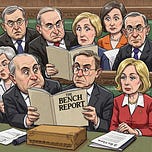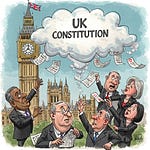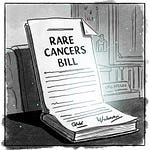This episode, we head into the crucial discussions that took place during the recent House of Commons debate on British Sign Language (BSL) Week. Understanding these conversations is vital as they highlight both the progress made and the significant steps still needed to achieve true accessibility and inclusion for the deaf community in the UK.
If you're interested in more extended shownotes from other Bench Report episodes, please consider subscribing now!
The Briefing: BSL Week
The debate, held on 20th March 2025, served as a vital platform to celebrate BSL as a language and culture for the approximately 87,000 first-language signers in the UK and the wider community of around 151,000 people whose first or preferred language is BSL. As Jen Craft MP (Thurrock) highlighted, BSL embodies culture, community, and a sense of belonging, empowering deaf individuals to overcome societal barriers.
A central focus of the discussion was the urgent need for improved accessibility and inclusion for BSL users across various aspects of life. Chris Vince MP (Harlow) underscored the importance of accessibility within Parliament itself, so that BSL users can fully participate in politics. The issue of inconsistent BSL translation in public services, often described as a "postcode lottery," was also raised by Matt Vickers MP (Stockton West), who pointed out the disparity compared to investment in foreign language translation.
The debate also shed light on the critical role of early years BSL support for families. Jen Craft MP noted the concerning statistic that around 90% of deaf children are born to hearing parents, yet access to BSL learning support is inconsistent across the country. Perran Moon MP (Camborne and Redruth) shared a constituent’s experience, illustrating a missed opportunity to provide BSL education to hearing parents of deaf children from the outset.
While acknowledging the landmark BSL Act 2022, speakers emphasized that its legal recognition needs to translate into tangible improvements. The Act, praised by Ms Julie Minns MP (Carlisle) for its requirement of three-yearly reports on BSL use by Government departments, is seen as a major step forward. However, Jen Craft MP pointed out that the fact that some Government Departments still have no BSL communications highlights the work remaining. Government data indicates that BSL activity in Government communications did double between May 2023 and April 2024, and the number of departments with no BSL communications halved.
The delayed rollout of the BSL GCSE in England was a significant concern. Ben Coleman MP (Chelsea and Fulham) argued that its implementation is essential for promoting BSL awareness and creating more opportunities for deaf individuals in employment and beyond. Despite agreed-upon BSL qualifications within the deaf community, issues around qualification structure are causing these delays.
A fundamental issue raised was the lack of societal understanding and awareness of BSL as a distinct language, different from spoken English. Alison Hume MP (Scarborough and Whitby) reflected on the visual nature of BSL, suggesting that many hearing constituents are unintentionally excluded due to this lack of understanding. Matt Vickers MP shared how the organisation MeSign highlighted that written English is not a direct equivalent to BSL for deaf individuals. The principle of "Nothing About Us Without Us," emphasized by Jen Craft MP, calls for the deaf community to be at the forefront of designing and delivering BSL services.
The debate also touched upon cost barriers to learning BSL, as highlighted by Noah Law MP (St Austell and Newquay), the importance of BSL in community settings like churches, mentioned by Jim Shannon MP (Strangford), and the general frustration within the deaf community about inadequate societal integration, as articulated by Matt Turmaine MP (Watford).
Members of Parliament urged the Government to increase funding for sign language classes, establish a universal BSL support service for families of deaf children, and swiftly implement the BSL GCSE. There were also calls for embedding deaf voices in policymaking and public service delivery. The Minister present committed to fully implementing the BSL Act, reviewing progress, and publishing BSL plans for each Government Department.
Don’t forget to head to the podcast website to listen to this episode on the platform of your choice. Follow to receive new episodes as soon as they are released.
Key Terms
BSL (British Sign Language): The primary language used by deaf people in the UK. It is a visual-gestural language with its own grammar and syntax, distinct from spoken English.
BSL Act 2022: Legislation in the UK that legally recognized British Sign Language as a language and placed requirements on government departments regarding its promotion and use.
Postcode Lottery: A situation where the availability and quality of services, such as BSL interpretation and education, vary significantly depending on the geographical area (postcode) in which a person lives.
Parliamentary Sources
Hansard: British Sign Language Week. Volume 764: debated on Thursday 20 March 2025
Question Time
How many people in the UK use BSL as their first language? Approximately 87,000 people in the UK use BSL as their first language.
What was a key piece of legislation mentioned in the debate related to BSL? The British Sign Language Act 2022 was highlighted as a significant step towards legal recognition and promoting BSL.
What is a major concern regarding BSL education? The delay in rolling out the BSL GCSE in England and the inconsistent provision of early years BSL support for families of deaf children are major concerns.
What is meant by linguistic exclusion in the context of BSL users? Linguistic exclusion refers to the barriers and disadvantages faced by BSL users due to a lack of understanding and provision for their language needs, leading to difficulties in accessing information, services, and full participation in society.
What progress has the government made since the BSL Act? BSL activity in Government communications has doubled, and the number of Government Departments with no BSL communications has halved.
Politics is everyone’s business. Know someone who will benefit from knowing more about this issue? Please share The Bench Report with them.
Take action
Learn some basic BSL: Even learning a few basic signs can significantly improve communication and demonstrate inclusivity. Consider looking for introductory BSL courses in your local area or online.
Advocate for accessibility: If you encounter services or organisations that lack BSL provision, politely inquire about their accessibility measures and advocate for improvements.
Support the rollout of the BSL GCSE: If you are a parent, educator, or have an interest in education policy, consider contacting your local MP to express your support for the swift implementation of the BSL GCSE.
Be mindful of language: When communicating with deaf individuals, remember that written English is not a direct equivalent to BSL. Consider providing information in visual formats where appropriate.
Amplify deaf voices: Follow deaf individuals and organisations on social media and share their content to help raise awareness and understanding of BSL and deaf culture.
Join the campaign
Find us on socials: X / Bluesky / Facebook / Instagram
Shape our next episode! Get in touch with an issue important to you - I’ll grab another coffee and start the research!
Email: thebenchreportuk@gmail.com
Astound friends with your perfected political punditry! If you're interested in more extended shownotes from other Bench Report episodes, please consider subscribing.













Share this post